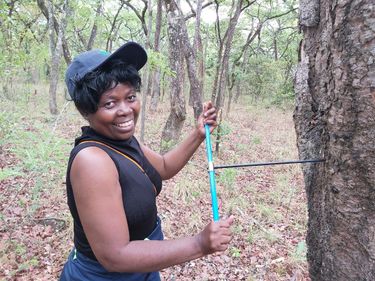
Sessions in which Bruna Hornink participates
Wednesday 29 June, 2022
Oxygen isotope ratios in tree rings (δ18OTR) from Amazon forests have been shown to provide historical records of rainfall amounts at a large scale, due to the rainout of heavy isotopes during moisture transport. Here, we present a 110-year oxygen isotope record obtained from tree ring-cellulose of six Cedrela odorata trees (rbar = 0.57, EPS = 0.89) from the region of Tapajos River, Eastern Amazon. Our analysis indicates that δ18OTR series reflects inter-annual variability of wet season (J...
Sessions in which Bruna Hornink attends
Monday 27 June, 2022
MAIDENiso is a numerical process-based model that allows researchers to simulate the growth of a virtual tree. Using daily meteorological data, the model simulates the physical and physiological processes taking place in the tree and its environment, to produce daily and yearly outputs comparable to dendrological observations. The model has been adapted and used successfully in boreal regions in North America. In an inverse mode, tree-ring obs...
Free, in person and onlineThe stable isotopic compositions of carbon and oxygen (d13C and d18O) measured in tree rings are valuable proxies for reconstructing paleoclimate and are increasingly used as paleophysiological proxies. Applying these proxies in ecophysiology and paleoclimate can be challenging as they rely on complex process-based models and poorly constrained input data. In recent years, h...
Tuesday 28 June, 2022
Africa is faced with a number of challenges including climate change and ecological disturbance due to various anthropogenic activities. These problems adversely affect the forests and also ecosystem services. My appreciation for the forests motivated me to pursure my undergraduate studies in Forestry. I first applied dendrochronology during my PhD research which focused on understanding the climate change vulnerability of the Zambezi teak forests in Zambia. However, lack of research facil...
Tree-ring time series provide long-term, annually resolved information on the growth of individual trees. However, public tree-ring archives contain a considerable portion of data collected from trees that have been selected with specific research questions in mind (e.g., for climate reconstruction). This makes these archives a biased representation of the sensitivity of forest ecosystems to ongoing climate variation (e.g. temperature, precipitation), including non-stationarity (i.e....
Tree-ring time series provide long-term, annually resolved information on the growth of individual trees. However, public tree-ring archives contain a considerable portion of data collected from trees that have been selected with specific research questions in mind (e.g., for climate reconstruction). This makes these archives a biased representation of the sensitivity of forest ecosystems to ongoing climate variation (e.g. temperature, precipitation), including non-stationarity (i.e....
Historical accounts in the Brazilian Digital Library provide independent support for most of the tree-ring reconstructed wet season rainfall extremes in the eastern Amazon during the late-18th and 19th centuries. Newspapers, government reports, and other documents describe crop failure, livestock mortality, water shortages, and ship groundings on the Amazon River during many of the tree-ring reconstructed drought extremes. Heavy rains and flooding are described during some of the wet extre...
Wednesday 29 June, 2022
Information garnered from historical timbers and wooden artifacts (e.g. houses, barns, ships) can greatly enhance our understanding of human, ecological, and climate history, especially in regions where few old-growth forests and trees remain, tree longevity is relatively short (less than 300-400 years), and environmental conditions break down wood rather quickly, like in mesic to wet regions. Over the last decade plus, the application of tree-ring techniques on wo...
Dendroclimatology in the tropical forest regions has lagged behind the more temperate forested regions of the world because of the challenge of determining annual ring formation. Despite over 230 tropical tree species known to form annual rings, the ITRDB shows few published chronologies in tropical forests in Sub-Saharan Africa. As part of the first “Training in Tree-Ring Science and its Applications” workshop conducted in Kitwe, Zambia, our team explored the dendroclimatic potential of B...
Water scarcity is a major 21st century challenge that is increasing the vulnerability of the human population, especially in cities. Water risk assessment is a fundamental task in many cities worldwide that often lack long-term and spatially-resolved records of precipitation and level of water reservoirs. Past rainfall and reservoirs levels may be alternatively assessed using tree-ring stable isotopes of urban trees. We assessed the past variability of precipitation and reservoirs level th...
Hydroclimate variability in tropical South America is strongly regulated by the South American Summer Monsoon (SASM). However, past precipitation changes are poorly constrained due to limited observations and high-resolution paleoproxies. We found that summer precipitation and the El Niño-Southern Oscillation tarapacana (ENSO) in the Chilean variability and Bolivian are well registered Altiplano in in tree-ring the Central stable Andes oxygen (18–22°S, isotopes ∼4,500 (δ18OTR) m a.s.l.) of...
Recent studies have shown that long-lived tropical trees are able to recover from senescence stages and maintain high rates of aboveground carbon and biomass accumulation throughout their life span. In this study, we present a tree-ring-based analysis to estimate the annual accumulation of aboveground biomass (AGB) and carbon (C-accumulation) of an Ocotea porosa tree over the last five centuries (1485–2016). The study site is located in southern Brazil, under a subtropical climate. AGB was...
The main objective of this project is to quantify the increased productivity of Betula glandulosa Michx in Umiujaq, Nunavik, northern Quebec and evaluate how climatic and edaphic conditions influence this change. The speed at which climate change is affecting the northern ecosystems remains poorly understood and data are needed to anticipate future ecological and physiological trajectories of the vegetation. We produced a tree-ring chronology from approximately 40 specimens of Betula gland...
It has been shown that trees get older in the wet tropics, but the mechanisms behind this observation are still not clear. Literature shows that moisture could directly affect longevity by modulating physiological processes of trees. Other studies point to the potential role of water on tree size, which could indirectly affect longevity if one reconciles to the fact that the growth rate of tropical trees doesn’t differ significantly between wet and dry sites. The third group points to the ...
This is a mandatory (!) .... and FREE (!!) cocktail & award ceremony (!!!)(in replacement of the Banquet formula)->->->->->->->->->->->->->->->->->->After a great summer day of scientific and urban discoveries in our beloved MTL, we wish to bring together all the AmeriDendro community in one place and congratulate the TRS awardees for their remarkable achievements! -Bonsinsegna award-Fr...
Thursday 30 June, 2022
How old are tropical trees? This fundamental question has long driven the curiosity of laymen and scientists. But only recently, a great number of studies conducted by many brave dendrochronologists resulted in a significant tree-ring-based knowledge that allows us to start accurately estimating tree ages across the globe. As science goes, not only knowing the longevity of tropical trees is essential to understanding forest dynamics and its role in biogeochemical cycles, but one must also ...
Dendrochronological archives in the tropics of the Americas have been under-studied for a long time. Some of the challenges include the Identification of tree-ring boundaries in certain tree species, absence of winter dormancy associated to low temperatures in most of the cases, and logistic difficulties of fieldwork in remote sites. However, part of the slow progress is also related to the fact that historically much less resources have been inv...
Under elevated CO2, photosynthetic carbon isotope discrimination is expected to increase in response to photosynthesis stimulation. While this response is widely documented in laboratory and field experiments, long-term proxies indicate that such response is not universally observed in response to the growth of atmospheric CO2. We investigated historical trends of photosynthetic carbon isotope discrimination derived from carbon isotope measurements of tree rings (Δ13C) from 147 chron...
Drought conditions have been projected to increase globally as atmospheric CO2 (ca) and vapor pressure deficit (VPD) increase. Experimental and modelling studies have suggested that forest responses to drought may be bolstered by increased ca, but it remains unclear how prevalent this response is in natural forest ecosystems. We developed a framework using intrinsic water use efficiency (WUEi = assimilation (A)/ stomatal conductance (gs)) and evaporative water use efficiency (WUEE = A/tran...
Allies have emerged as key enablers of diversity and inclusivity initiatives in the workplace, in professional associations, and in everyday life. But what is an ally? What skills are required to be an effective ally? How do we hold ourselves and our community members accountable for being effective allies? This symposium will provide a deeper understanding of what it means to be an ally and the skills to help advance allyship as individuals and as a community. Fur...
(by bus, max 92 people)Designed for visitors and newcomers, the tour is based on the pleasure...


